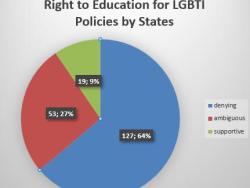GALE asks members for feedback on strategic plan

12 July 2018 - GALE asks its members for feedback on the new draft strategic plan for 2018-2022. The key priority of the strategy is to map the situation of students in countries, to make policy recommendations and to stimulate and support cooperation between NGOs, schools and the government for structural improvement. Secondary goals are to collects and disseminate good practices and to develop key methods to facilitate change in schools.
The new plan is presented in a period of little funding. This makes it difficult to plan activities. Therefore, the plan offers three scenarios for concrete implementation. One scenario is for a context with no funding, one for low funding and the third for adequate funding.
The strategic plan can be downloaded here. Members who want to comment, can do this on the open forum page strategy discussion.
Three key objectives
The new strategic plan has three main goals:
- Stimulate national strategic action. This will be done by sustaining the strategy to map the situation in schools in each country and to use these analyses facilitate the dialogue between NGOs, schools and the government. Only a structural cooperation between civil society (especially LGBTI NGOs), key actors in the education sector and the Ministry of Education can lead to structural improvement of the situation of DESPOGI students.
- Raise the quality of education activities. Activists have developed hundreds of interventions, but both the outreach and quality were often limited. Activists and teachers need to know more about what works and what does not work so well. GALE will do ground work on finding out what type of methods are effective. GALE also will collect and review good (and bad) practices to role model what are the right things to do.
- Advocate internationally. There is little advocacy for the right to education internationally, and certainly little attentions for LGBTI or DESPOGI in schools. We need to strengthen this effort. GALE will cooperate with international stakeholders by providing them with data and arguments to advocate for high quality inclusive schools and school systems.
Regional differences
When GALE started over 10 years ago, there was still much confusion about if it was even possible to develop a global strategy to combat homophobia and transphobia. Governments don’t like to agree on global education strategies because they consider education to be a key for local cultural values. Especially conservative States attempt to prevent any international influence on their educating strategy out of fear their morals will be under attack. Activists sometimes link into this narrative by feeling their contexts are unique and out of fear Western actors will weaken their struggle with neocolonial education methods.
GALE has been very careful to navigate such tensions. GALE only actively recruited new members in the Global South to make sure the membership would maintain a North-South balance and perspective. The draft strategic plan contains six annexes which make a first attempt to outline how the global priorities can make a culturally sensitive difference in different regions. The GALE differentiations between denying, ambiguous and supportive States also is a big help to get more strategic insight and to plan next national steps.
Next steps
The strategic plan can be downloaded here. Members who want to comment, can do this on the open forum page strategy discussion.
This is the fifth version of the strategic plan. The GALE Supervisory Council started developing it in the summer of 2017. The Advisory Council of GALE members has given comments. After this final round of comments with then members themselves, the Supervisory Council will approve the final version in November.
Because of the lack of funding, it is essential that GALE builds alliances with other global and local organizations and with global donors. The strategic plan contains numerous suggestions for such collaborations.
Peter Dankmeijer


